The postpartum health supplements market is expected to increase from USD 1.5 billion in 2025 to USD 3.5 billion in 2035, registering a compound annual growth rate (CAGR) of 9%, representing an absolute dollar opportunity of USD 2.0 billion over the decade. Incremental market value grows steadily, rising from USD 1.6 billion in 2026 to USD 2.3 billion by 2030 and USD 3.2 billion in 2034. Expansion is driven by rising awareness of maternal nutrition, increasing postpartum supplementation adoption, and greater healthcare accessibility. The growing demand for vitamins, minerals, and functional nutrients provides substantial revenue potential for manufacturers, highlighting a strong long-term market opportunity.
Quick Stats for Postpartum Health Supplements Market
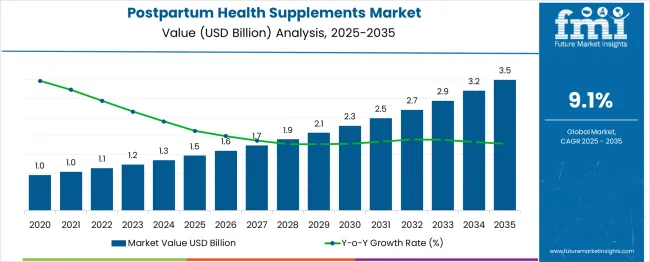
| Metric | Value |
|---|---|
| Estimated Value in (2025E) | USD 1.5 billion |
| Forecast Value in (2035F) | USD 3.5 billion |
| Forecast CAGR (2025 to 2035) | 9% |
The postpartum health supplements market is shaped by several parent markets, each contributing to overall expansion from USD 1.5 billion in 2025 to USD 3.5 billion in 2035. The Vitamins & Minerals segment leads with an estimated 30% market share, driven by multivitamins, iron, calcium, and vitamin D supplements targeting maternal recovery and bone health. Probiotics & Digestive Health account for approximately 15%, reflecting rising awareness of gut microbiome benefits and improved immunity in postpartum women. Herbal & Botanical Supplements hold 12%, supported by demand for natural formulations and traditional remedies. Omega-3 & Fatty Acids capture around 10%, highlighting the focus on brain development and lactation support.
Protein & Amino Acid Supplements represent 8%, serving recovery and nutrition needs. Functional Beverages & Nutraceuticals contribute 7%, encompassing fortified drinks and convenient delivery formats. Specialty Nutrients such as choline, DHA, and prebiotics hold 6%, while Other Dietary Supplements, including adaptogens and micronutrient blends, comprise 12% collectively. These markets interact to define adoption patterns, with Vitamins & Minerals and Probiotics emerging as high-growth segments. Manufacturers and investors can target these leading categories for portfolio expansion, while emerging segments like specialty nutrients and functional beverages offer opportunities for innovation, diversification, and capturing incremental market share over the forecast period.
Market expansion is being supported by the increasing awareness about the critical nutritional needs during the postpartum period and the corresponding demand for specialized recovery support products. Modern mothers are increasingly focused on comprehensive health measures that can support recovery, energy restoration, and overall wellness during the challenging postpartum phase. The proven benefits of targeted supplementation in supporting maternal health, milk production, and energy levels make these products essential components of postpartum care routines.
The growing emphasis on natural health solutions and clean ingredient formulations is driving demand for postpartum supplements derived from organic and natural sources. Consumer preference for multifunctional products that combine various nutritional benefits in convenient delivery formats is creating opportunities for innovative formulations. The rising influence of social media maternal health advocates and healthcare provider recommendations is also contributing to increased product adoption across different demographics and regions.
The market is segmented by product outlook, formulation outlook, and sales channel outlook. By product outlook, the market is divided into combined nutritional supplements and single nutritional supplements (including vitamins, minerals, herbal supplements, proteins, omega-3, probiotics, and others). Based on formulation outlook, the market is categorized into capsules/tablets, softgels, powder, liquid, and others. In terms of sales channel outlook, the market is segmented into pharmacies/drug stores, online sales channel, direct sales channel, and other offline channels. Regionally, the market is divided into North America, Europe, Asia Pacific, Latin America, and Middle East & Africa.
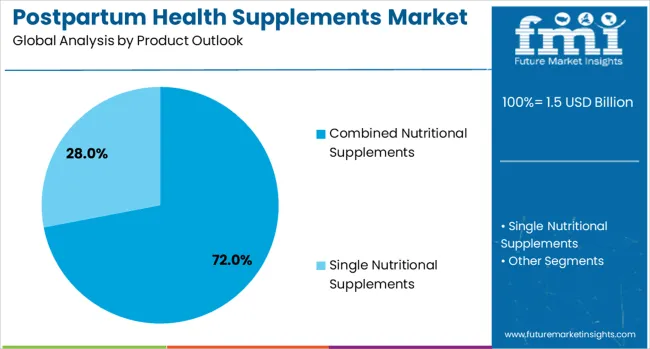
The combined nutritional supplements segment is expected to account for 72% of the postpartum health supplements market in 2025, retaining its dominance as the leading product category. These formulations deliver multiple essential nutrients in a single product, meeting the diverse dietary and recovery needs of postpartum mothers. Healthcare providers increasingly recommend combined supplements for their efficiency in supporting energy, immunity, lactation, and overall recovery. With time constraints and the complexity of postpartum nutrition, mothers prefer streamlined supplementation regimens that reduce pill burden and ensure comprehensive coverage. This segment’s reliability and convenience make it the primary growth driver of the postpartum supplements market.
Capsules and tablets are projected to represent 38% of postpartum health supplement demand in 2025, highlighting their position as the preferred delivery format. This format provides precise nutrient dosing, extended shelf life, and ease of consumption, appealing to mothers seeking reliable and convenient supplementation. Consumer familiarity with tablets and capsules, along with healthcare provider confidence in standardized dosing, supports segment growth. Innovations in coating technology, time-release formulations, and taste masking improve nutrient absorption and minimize gastrointestinal discomfort. The convenience, portability, and discretion of capsules and tablets align with busy postpartum lifestyles, ensuring their continued prominence in the formulation landscape.
The pharmacies and drug stores segment is projected to account for 33% of postpartum health supplement demand in 2025, reflecting the importance of trusted retail environments and professional guidance. These channels provide credibility through pharmacist consultations, product authenticity assurance, and immediate product availability, which resonate with health-conscious postpartum mothers. The segment benefits from established healthcare networks, professional endorsements, and integrated services that allow mothers to seek advice while purchasing supplements. Pharmacies also offer opportunities for insurance coverage and prescription alignment, further supporting accessibility. With a focus on safety, reliability, and professional oversight, this segment remains a crucial channel for postpartum nutritional support solutions.
The postpartum health supplements market is growing as awareness of maternal nutrition needs after childbirth increases. New mothers often face nutritional deficiencies that affect both recovery and breastfeeding. Supplements rich in vitamins, minerals, and omega-3 fatty acids are becoming widely recommended by healthcare professionals. Educational campaigns from hospitals, NGOs, and wellness platforms emphasize the importance of maternal nutrition during the postpartum phase. This has encouraged mothers to adopt supplements for faster healing, improved energy, and enhanced immunity.
Another dynamic shaping the postpartum health supplements market is the increasing demand for natural and herbal formulations. Many new mothers prefer products made from plant-based ingredients, free from synthetic additives or allergens. Herbal blends containing fenugreek, ashwagandha, and turmeric are popular for supporting lactation, stress relief, and physical recovery. Manufacturers are focusing on clean-label products to cater to health-conscious consumers who prioritize safety for both mother and infant. The growing trust in natural remedies, combined with traditional practices being integrated into modern supplement formulations, has expanded product offerings globally.
The rapid rise of e-commerce and digital health platforms is transforming how postpartum supplements reach consumers. Online channels allow new mothers to conveniently access a wide variety of products, compare reviews, and receive doorstep delivery. Subscription-based services offering personalized supplement packages have gained popularity, particularly among tech-savvy consumers. In addition, collaborations between supplement brands and telehealth providers are enabling customized nutrition plans based on medical consultation. Digital platforms are also effective in educating mothers about the benefits of supplements, further boosting demand.
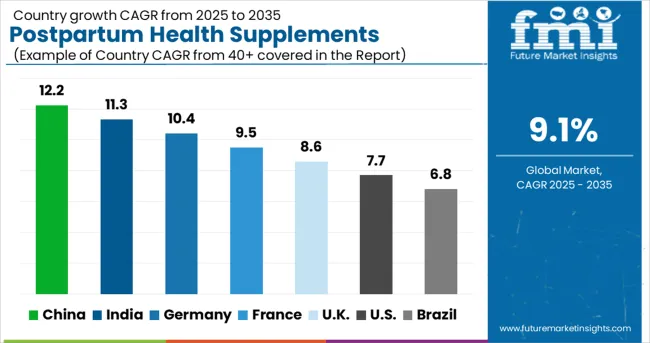
| Country | CAGR (2025-2035) |
| China | 12.2% |
| India | 11.3% |
| Germany | 10.4% |
| France | 9.5% |
| U.K. | 8.6% |
| U.S. | 7.7% |
The postpartum health supplements market is experiencing robust growth globally, with China leading at a 12.2% CAGR through 2035, driven by rising birth rates, increasing health awareness, and growing acceptance of nutritional supplementation during maternal recovery. India follows at 11.3%, supported by expanding healthcare access, cultural focus on postpartum care, and increasing disposable income among urban populations. Germany shows strong growth at 10.4%, emphasizing evidence-based formulations and natural ingredient preferences. France records 9.5%, focusing on comprehensive maternal care and premium supplement solutions. The UK shows 8.6% growth, prioritizing natural health approaches and clean label products.
The report covers an in-depth analysis of 40+ countries top-performing countries are highlighted below.
The postpartum health supplements market in China is expected to expand at a CAGR of 12.2% through 2035, driven by government initiatives promoting maternal wellness, increasing awareness of postpartum nutrition, and rising adoption of supplementation practices among new mothers. Rapid economic growth, expanding healthcare infrastructure, and changing lifestyle trends are creating significant opportunities for premium maternal recovery products. Domestic and international supplement companies are establishing comprehensive distribution networks and digital platforms to serve urban and suburban populations. Focused marketing campaigns and maternal health education programs are enhancing consumer trust and encouraging early adoption of scientifically formulated recovery supplements.
The postpartum health supplements market in India is projected to grow at a CAGR of 11.3% through 2035, supported by cultural emphasis on maternal care, increasing healthcare accessibility, and rising awareness about the importance of postpartum nutrition. Traditional postpartum practices are being integrated with modern supplementation, creating demand for products that combine conventional wisdom with scientifically backed nutritional benefits. Large population size, increasing disposable income, and growth of urban healthcare facilities are fueling demand for both domestic and international supplement brands. Companies are tailoring product portfolios to regional preferences while educating mothers on nutritional recovery through digital platforms and healthcare provider programs.
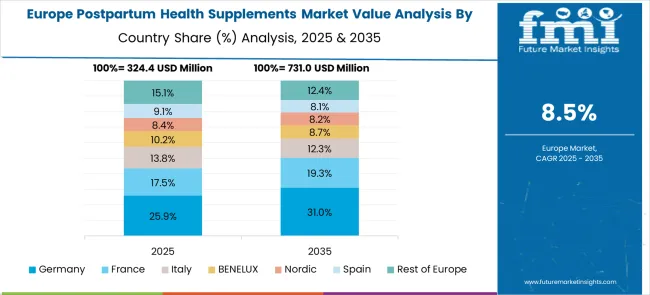
The postpartum health supplements market in Germany is anticipated to expand at a CAGR of 10.4% through 2035, supported by well-established healthcare infrastructure, strict quality regulations, and high consumer preference for clinically validated products. German mothers prioritize safety, natural ingredients, and eco-efficient sourcing in supplement selection. Demand for premium products combining multiple nutritional benefits for maternal recovery is increasing. International and domestic supplement manufacturers are emphasizing transparency, research-backed formulations, and compliance with European Union regulations to enhance credibility. Healthcare provider recommendations and nutrition specialist guidance are strengthening consumer confidence and driving consistent adoption in both urban and suburban markets.
The postpartum health supplements market in France is expected to grow at a CAGR of 9.5% through 2035, fueled by a combination of advanced healthcare infrastructure, strong maternal care initiatives, and consumer preference for premium nutritional products. Mothers rely on healthcare provider guidance to select effective postpartum recovery supplements, while public awareness campaigns emphasize nutritional support during the postnatal period. Companies are focusing on product differentiation by offering scientifically formulated solutions with high bioavailability and tailored nutritional profiles. E-commerce and specialty retail expansion are facilitating accessibility across urban and semi-urban regions, while collaborations with hospitals and wellness clinics are enhancing product credibility and market penetration.
The postpartum health supplements market in the United Kingdom is projected to grow at a CAGR of 8.6% through 2035, driven by increasing awareness of maternal nutrition, demand for natural health products, and growing focus on clean-label formulations. Mothers value ingredient transparency, eco-efficient sourcing, and verified efficacy, influencing purchasing decisions. Expanding online retail platforms and specialized maternal health stores are increasing product accessibility. Supplement brands are introducing ethically sourced and organic formulations to differentiate their offerings. Education campaigns targeting healthcare providers and mothers are improving understanding of nutritional benefits, driving adoption across both private and public healthcare channels, and reinforcing the market growth trajectory for postnatal health solutions.
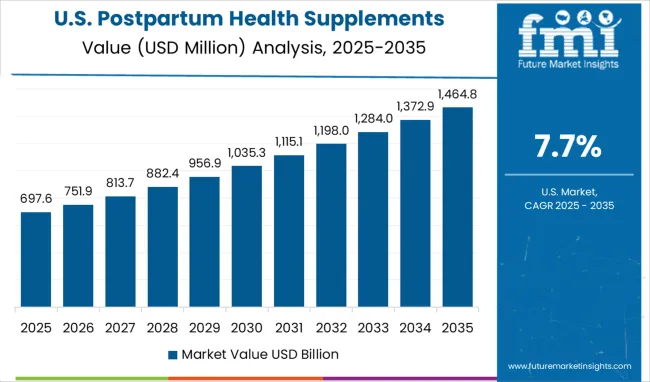
The postpartum health supplements market in the United States is expected to expand at a CAGR of 7.7% through 2035, supported by a well-established healthcare system, high awareness of maternal health, and strong demand for personalized nutrition. American mothers increasingly seek scientifically validated supplements for postnatal recovery and wellness. Healthcare providers and nutrition specialists are playing a key role in recommending products, while major domestic and international supplement companies are expanding distribution channels to reach diverse demographic segments. Product innovation, including specialized nutrient combinations and functional formulations, is contributing to market differentiation. Integration with digital health platforms and wellness programs is enhancing consumer engagement and adoption of postpartum nutritional solutions.
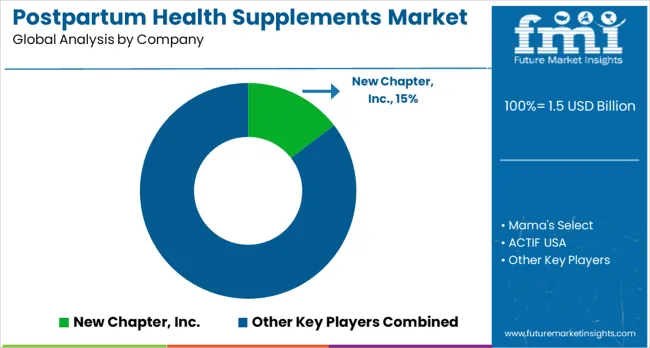
The postpartum health supplements market is defined by competition among established nutritional companies, specialized maternal health brands, and emerging clean-ingredient providers. Significant investments are being made in clinical research, evidence-based formulation development, premium packaging solutions, and targeted digital marketing initiatives. Distribution networks and e-commerce channels are being optimized to ensure accessible, safe, and effective maternal recovery solutions. Brand trust, product efficacy, and professional healthcare endorsements are emphasized to strengthen market presence and build long-term consumer confidence.
New Chapter, Inc., headquartered in the U.S., holds a leading position in the global market, capturing an estimated 15% of total value. Comprehensive maternal nutrition solutions are provided with a focus on organic ingredients, holistic health approaches, and functional recovery support. Mama's Select delivers specialized postpartum supplements emphasizing natural recovery, breastfeeding compatibility, and gentle formulations. ACTIF USA provides science-backed products, highlighting clinical validation, safety standards, and regulatory compliance. Anya Healthcare integrates personalized nutrition plans and innovative delivery systems to meet modern maternal needs.
Global players such as DSM-FIRMENICH provide both ingredient solutions and finished products across diverse market segments. Pink Stork specializes in maternal health formulations with targeted ingredient selection and natural product positioning. Mommy's Bliss, Inc. offers gentle, effective products designed for maternal and infant wellness. The Honest Company, Inc. emphasizes clean-label formulations, transparency, and premium-quality positioning. Nordic Naturals delivers omega-3 products with a focus on purity, bioavailability, and environmentally conscious sourcing.
| Items | Values |
|---|---|
| Quantitative Units (2025) | USD 1.5 billion |
| Product Outlook | Combined nutritional supplements, Single nutritional supplements (Vitamins, Minerals, Herbal supplements, Proteins, Omega-3, Probiotics, Others) |
| Formulation Outlook | Capsules/Tablets, Softgels, Powder, Liquid, Others |
| Sales Channel Outlook | Pharmacies/Drug stores, Online sales channel, Direct sales channel, Other offline channels |
| Regions Covered | North America, Europe, Asia Pacific, Latin America, Middle East & Africa |
| Countries Covered | United States, Canada, United Kingdom, Germany, France, China, Japan, India, Brazil, Australia and 40+ countries |
| Key Companies Profiled | New Chapter, Inc., Mama's Select, ACTIF USA, Anya Healthcare, DSM-FIRMENICH, Pink Stork, Mommy's Bliss, Inc., The Honest Company, Inc., and Nordic Naturals |
| Additional Attributes | Dollar sales by supplement type and formulation, regional demand trends, competitive landscape, buyer preferences for natural versus synthetic ingredients, integration with healthcare provider recommendations, innovations in personalized nutrition, targeted delivery systems, and eco-efficient sourcing practices |
The global postpartum health supplements market is estimated to be valued at USD 1.5 billion in 2025.
The market size for the postpartum health supplements market is projected to reach USD 3.5 billion by 2035.
The postpartum health supplements market is expected to grow at a 9.1% CAGR between 2025 and 2035.
The key product types in postpartum health supplements market are combined nutritional supplements, single nutritional supplements, _vitamins, _minerals, _herbal supplements, _proteins, _omega-3, _probiotics and _others.
In terms of formulation outlook , capsules/tablets segment to command 38.0% share in the postpartum health supplements market in 2025.






Full Research Suite comprises of:
Market outlook & trends analysis
Interviews & case studies
Strategic recommendations
Vendor profiles & capabilities analysis
5-year forecasts
8 regions and 60+ country-level data splits
Market segment data splits
12 months of continuous data updates
DELIVERED AS:
PDF EXCEL ONLINE
Postpartum Depression Management Market Size and Share Forecast Outlook 2025 to 2035
Healthcare Regulatory Affairs Outsourcing Market Size and Share Forecast Outlook 2025 to 2035
Healthcare and Laboratory Label Industry Analysis in the United States Size and Share Forecast Outlook 2025 to 2035
Health and Fitness Club Market Forecast Outlook 2025 to 2035
Healthcare Flooring Market Size and Share Forecast Outlook 2025 to 2035
Healthcare AI Computer Vision Market Size and Share Forecast Outlook 2025 to 2035
Healthcare Business Intelligence Market Size and Share Forecast Outlook 2025 to 2035
Healthcare Master Data Management Market Size and Share Forecast Outlook 2025 to 2035
Healthcare and Laboratory Label Industry Analysis in Japan Size and Share Forecast Outlook 2025 to 2035
Healthcare and Laboratory Label Industry Analysis in Western Europe Size and Share Forecast Outlook 2025 to 2035
Healthcare Contact Center Solution Market Size and Share Forecast Outlook 2025 to 2035
Healthy Snacks Market Size and Share Forecast Outlook 2025 to 2035
Healthcare Semiconductor Market Size and Share Forecast Outlook 2025 to 2035
Healthcare Cold Chain Logistics Market Size and Share Forecast Outlook 2025 to 2035
Healthcare Mobile Computers Market Size and Share Forecast Outlook 2025 to 2035
Healthcare Cloud Infrastructure Market Size and Share Forecast Outlook 2025 to 2035
Healthcare Companion Robots Market Size and Share Forecast Outlook 2025 to 2035
Healthcare Analytical Testing Services Market Size and Share Forecast Outlook 2025 to 2035
Healthcare Analytics Market Size and Share Forecast Outlook 2025 to 2035
Healthcare and laboratory labels market Size, Share & Forecast 2025 to 2035

Thank you!
You will receive an email from our Business Development Manager. Please be sure to check your SPAM/JUNK folder too.
Chat With
MaRIA